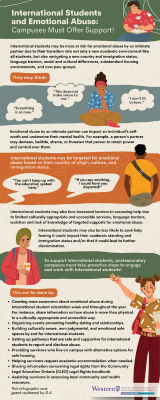Our Work
.
International Students and Emotional Abuse: Campuses Must Offer Support!

This infographic shares some of the ways international students experience emotional abuse, barriers to accessing help, and how postsecondary campuses can take proactive steps to offer supports.
June 2024
International students may be more at risk for emotional abuse by an intimate partner due to their transition into not only a new academic environment like all students, but also navigating a new country and immigration status, language barriers, social and cultural differences, substandard housing environments, and new peer groups.
They may think:- "Everything is so new."
- "This does not make sense to me."
- "I don't fit in here."
Emotional abuse by an intimate partner can impact an individual’s selfworth and undermine their mental health. For example, a person’s partner may demean, belittle, shame, or threaten that person to retain power and control over them.
International students may be targeted for emotional abuse and may face microaggressions based on their identity, including country of origin, culture, and immigration status.
“You can’t keep up with the education system here.”
“If you say anything, I could have you deported!”
International students may also face increased barriers to accessing help due to limited culturally appropriate and accessible services, language barriers, isolation and lack of knowledge of targeted supports for emotional abuse. International students may also be less likely to seek help fearing it could impact their academic standing and immigration status and/or that it could lead to further discrimination.
To support international students, postsecondary campuses must take proactive steps to engage and work with international students!
This can be done by:
- Creating more awareness about emotional abuse during international student orientation week and throughout the year. For instance, share information on how abuse is more than physical in a culturally-appropriate and accessible way.
- Organizing events promoting healthy dating and relationships.
- Building culturally aware, non-judgmental, and emotional safe spaces by and for international students.
- Setting up pathways that are safe and supportive for international students to report and disclose abuse.
- Providing survivors who live on campus with alternative options for safe housing.
- Helping survivors request academic accommodation when needed.
- Sharing information concerning legal rights from the Community Legal Education Ontario (CLEO) Legal Rights handbook.
- Assisting survivors in accessing local community and health resources.
All our resources are open-access and can be shared (e.g., linked, downloaded and sent) or cited with credit. If you would like to adapt and/or edit, translate, or embed/upload our content on your website/training materials (e.g., Webinar video), please email us at gbvln@uwo.ca so that we can work together to do so.






